Here we describe a selection of our work in the year ending 31 December 2014, and look forward to the work that we plan to undertake in 2015.
Widowed Survivors Empowerment Project (WSEP)
Funder: UK Department for International Development (DFID)
Duration: April 2012 to March 2015
Partner: AVEGA
SURF in partnership with AVEGA, secured a three-year (2012-2015) Widowed Survivors Empowerment Project (WSEP) grant funded by DFID. This project was a continuation of work started under our 2010-2012 Comic Relief funded HIV+ Survivors Integration Project (SIP), but with a focus on the Northern, Southern and Western Provinces of Rwanda, principally to provide support to over 15,000 survivors in membership of AVEGA and 10,000 other survivors not yet in its membership and their dependents.
Many women in membership of AVEGA bear the multiple stigmas of being a survivor, of being raped during the genocide and of being HIV positive. WSEP has been working to transform the lives of women, and their dependants, by eradicating extreme poverty and hunger and empowering them to integrate into Rwandan society.
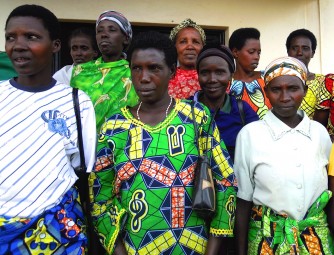
The primary focus of the project has been on developing widows’ livelihoods through income-generating cooperatives to support their social integration. The project provides holistic support by supporting genocide widows to secure ownership of land and property, develop viable livelihoods, and empower them to access available health services; delivering holistic care for those with HIV, and improving the prospects of their dependants to graduate from school. Through a strong network of AVEGA’s volunteers, widows that are old and housebound have been receiving support to ensure their food security and access to health care.
In March 2015, at the conclusion of the project we commissioned an independent evaluation of the project, undertaken by Lifetime Consulting. The project scored an A+ rating from DFID, with the report concluding that WSEP: “has made significant contributions in the lives of people. Among some of the key achievements, it is apparent that the project has supported widows to actively participate in entrepreneurship activities, leading to increased knowledge and skills to participate in IGAs, savings and credit schemes. As a result of training offered by the project, participants reported improved livelihoods and food security. In addition, more participants were supported to access legal support and counselling as a result of this project. The project also supported more people to access HIV testing services, leading a significant increase in the number of widows maintaining ARV treatment regime. A secondary outcome resulting from improved livelihoods was an increase in the number of dependents who were able to transition from primary to secondary schools, as well as those in graduating secondary school. Overall, the findings are remarkable.”
Genocide Widows Empowerment Project (GWEP)
Funder: Big Lottery Fund (BLF)
Duration: December 2012 to November 2015
Partner: AVEGA
Since its inception in December 2012, the Genocide Widows Empowerment Project (GWEP) has reached over 2,436 individuals, operating in five districts (Karongi, Rutsiru, Ngororero, Nyabihu, and Rubavu) in the Western province of Rwanda that previously did not have access to support. By developing viable livelihoods, addressing issues of legal rights, and accessing mental health care services, GWEP is reducing the extreme poverty of widows and empowering them to integrate into Rwandan society. The project is funded by the Big Lottery Fund in order to transform the lives of widowed survivors in the Western Province of Rwanda in partnership with AVEGA AGAHOZO.
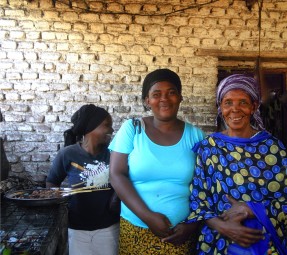
Built on a foundation of livelihood development, GWEP has fostered self-reliance in genocide widows through the establishment of marketable micro-businesses.
There have been three remarkable achievements in the areas of AVEGA’s institutional capacity development particularly in the five GWEP districts:
(1) Enabling its members to commemorate the genocide and their loved ones officially for the first time
(2) In the area of advocacy where elderly widows have secured a regular hardship grant of £30 a month from FARG which will enable them to buy one litre of milk every day,
(3) In the area of support, as Handicap International donated £1,000 to three IGA groups, 98 widows received free health care in Rubavu district, and in Ngororero district 19 houses have been built for 27 widows and orphans.
Some of the unexpected outcomes include the identification of mothers and widows raped during the genocide and their children and delivery of counseling services to them, support to AVEGA GWEP region to conduct two annual congresses at sector, district and provincial levels, identification of families and orphans to receive support from FARG (Government Fund for Survivors), and aiding election of AVEGA’s grassroots member committees.
There have been some challenges faced by the project, including the fact that the Loan Guarantee Fund (LGF) is oversubscribed and thus AVEGA members who have completed the training do not have access to start-up capital for their businesses. In addition, there has been an inability of the relevant authorities to expedite and enforce gacaca judgements particularly pertaining to awards of compensation.
To overcome the LGF issue we are increasing our efforts to monitor repayments by those who have already accessed loans, and to address the gacaca issues we are continuously advocating for the local government authorities to commit to enforce judgements.
Foundation Rwanda Project
Funder: Foundation Rwanda
Duration: Ongoing (started in January 2009)
Partners: Kanyarwanda, AVEGA, Solace Ministries
Through funding from Foundation Rwanda, Survivors Fund (SURF) is currently addressing the education and counselling needs of children conceived through rape during and under circumstances directly related to the 1994 genocide committed against Tutsi in Rwanda. The challenge for the affected mothers and children is that FARG, the government body that assists vulnerable survivors of the genocide, does not consider them eligible for support because they were born after genocide and thus are not by definition survivors. However, they are recognised to be a particularly vulnerable and marginalised population.
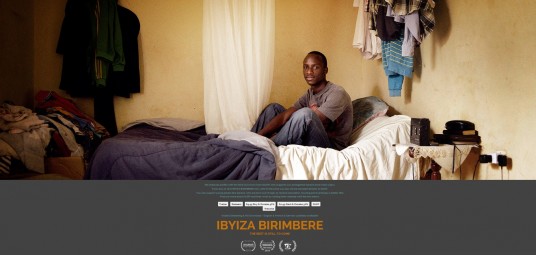
As of 2014, of the 735 students currently receiving support from Survivors Fund in partnership with Foundation Rwanda:
- 13 students are in the final two years of primary school
- 313 students are in lower secondary school (Years 1 to 3)
- 259 students are in upper secondary school (Years 4 to 6)
- 150 students are at vocational college
From the initial cohort that began receiving educational support from 2009:
- 39 students have graduated from secondary school
- 15 of which have received funding to attend institutions of higher learning
Early in the year, 46 students of the Foundation Rwanda programme were awarded scholarships by our partner Global Communities, thanks to SURF advocacy, to attend vocational and technical training institutions. We were informed at the last minute that the schools didn’t provide beddings, and that the offer was conditional on them having their own. SURF immediately secured forty-six mattresses, thanks to Good Gifts, and the students were able to attend school as a result. What we have evidenced through the education programme, is the importance of holistic support to households, which includes psychosocial support for mothers, as well as this supplementary support for the young people. As such, we are focusing in 2015 on delivering this holistic support to students still requiring assistance to complete their education, with the expectation that the final student will finish their studies in 2018, and the project can then close.
Good Gifts Project
Funder: Charities Advisory Trust
Duration: Ongoing
Partners: Various, including AERG, GAERG
Funding from Good Gifts, an initiative of the Charities Advisory Trust, enables survivors to become more independent and self-sufficient, in particular through livelihood development, as well as supplements existing programmes of SURF.
Survivors Fund (SURF) has had a long and important relationship with the Charities Advisory Trust, which has enabled us to deliver SURF’s mission in changing the lives of survivors for the better. There are now organisational livestock projects set up with funding from Good Gifts across Rwanda, as well as the thousands of individual survivors that continue to benefit from and re-gift livestock given to them.
In our effort to better the lives of women and young survivors, clean-efficient wood stoves and solar lamps provided through the Good Gifts programme were introduced to communities in 2014. As such, we were able to ensure safe and efficient cooking materials and adequate lighting, that allow students to study long hours, resulting in significant health and education benefits, in particular for survivors in more rural and isolated areas.
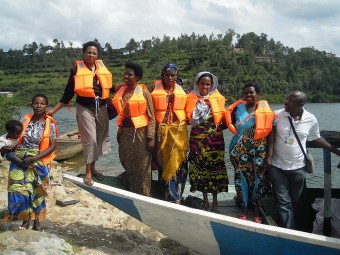
The project also focused in 2014 on the introduction of modern kitchen gardens to enable families to supplement food ordinarily eaten at home. Vegetables are an important part of a healthy diet and the only way to secure this is through use of kitchen gardens. A kitchen garden is a small space around the kitchen where people can plant mostly vegetables, such as cabbage, carrots, greens etc. They are practical, close to the home and provide for daily use. This has resulted in healthier lives, provided time for the pursuit of other activities (mostly skills and education), has given greater meaning to survivor lives and increased people’s independence
Amongst the numerous livestock projects that Good Gifts has funded, is the extension of a goat and cow farm in Nyagatare in the Eastern Province of Rwanda, which SURF helped AERG establish in 2012. The farms now boasts over 400 goats and 60 cows. In 2014, the farm has diversified with the introduction of 3,000 banana trees, which will be used for fodder and income generation. Income from the farm is used to meet the immediate needs of the association and its most vulnerable members. In 2014, about 300 goats were sold on the open market, raising £7,500, which contributed significantly to address AERG’s financial needs.
With the continuing support of Good Gifts, AERG and SURF plan on further developing the farm in 2015, which will require improved water holes and pumps and additional crops, in support of longer term goals for increased cattle production and an eco-lodge. The farm will also provide employment opportunity for young survivors.
Reparation Project
Funder: Unrestricted funding, in-kind support
Duration: Ongoing (from November 2009)
Partners: REDRESS, IBUKA, AVEGA, AERG (principal partners)
As the world commemorated the 20th anniversary of the genocide against the Tutsi in Rwanda in April 2014, Survivors Fund (SURF) and our partner organisations renewed our efforts to support survivors to realise their right to reparation.
Following a call from victim organisations in Rwanda for increased attention to the lack of a comprehensive reparation effort for victims of the genocide, the International Criminal Tribunal for Rwanda (ICTR) in December 2013 mandated the International Organisation for Migration (IOM) to conduct a study on the state of reparation for victims in post-genocide Rwanda.
In February 2014, IOM carried out its first consultation visit in Rwanda, resulting in a collaboration and MOU, in June 2014, with the Government of Rwanda, as well as consultations with the main survivor organisations. This is sending important signals of hope for survivors: for the first time since the genocide the Government of Rwanda – through the Minister of Justice and Attorney General of Rwanda – publicly recognised that survivors of the genocide have a right to reparation. The Minister of Justice expressed the government’s commitment to support initiatives addressing the right to reparation. In addition to the IOM study, the government announced the establishment of a new national forum for discussion on reparation within the Ministry of Justice to serve as a joint think-tank on how best to realise the right to reparation.
These developments are long overdue. For the past twenty years, survivors and survivor organisations have continuously called on the Government of Rwanda as well as the international community to provide adequate reparation to survivors. However, their calls remained mostly unheard, instead, emphasis was placed on the prosecution of the perpetrators before traditional ‘gacaca’ (community) courts and the UN International Criminal Tribunal for Rwanda (ICTR).
For genocide survivors, reparation is the most tangible manifestation of the state and the international community’s efforts in acknowledging and repairing their lives. The IOM study, carried out on in collaboration with the Government of Rwanda and civil society, is an encouraging step in the right direction. It is expected that the IOM’s final report, which will be submitted to the Government of Rwanda in 2015, will outline the roadmap for the way forward and include recommendations for all actors involved including the government of Rwanda and the international community.
In further support of the work on reparations, SURF spoke at a range of events and took up media opportunities to address this issue. Of note, SURF chaired a London University/King’s College inter-disciplinary panel discussion seminar entitled “A Just Response to Genocide?” at Somerset House, London, bringing together leading academics.
The real test however will be whether there will be the necessary political will to implement the recommendations in practice and provide adequate reparation to survivors. Survivors Fund (SURF) will continue to support our partner organisations in Rwanda in 2015 to advocate for reparation, in whatever form will ensure it is realised as soon as possible.
Youth Entrepreneurship Training Programme (YETP)
Funder: inspire!africa, André Cohen & Family
Duration: Ongoing (started in April 2012)
Partners: AERG
Skills, jobs and entrepreneurship are key to the well-being of young survivors and also contribute to strengthening the Rwandan economy. Survivors Fund (SURF) and AERG (The Association of Student Genocide Survivors) set up the Youth Entrepreneurship Training Programme (YETP) with the aim of providing valuable skills to vulnerable young people, and of reducing youth unemployment in Rwanda. Now into its third group of students, the initiative is showing strong results.
Young survivors face more hurdles than most in education and competing on the job market – those responsible for younger siblings, in orphan-headed households, have extra challenges without family to support them. With a burgeoning private sector and improvements in its economy Rwanda offers increasing opportunity, but competition for jobs and business creation remains fierce.
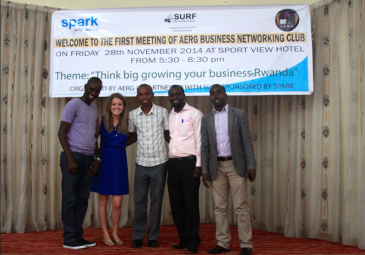
The rationale behind YETP is to help those most in need to obtain skills for jobs, in both job-readiness training and in entrepreneurship, so that young survivors become economically active, self-sufficient and provide for their dependants. After following an intensive and quality training programme, students present their business plans, and winners are provided with micro-finance loans to start up new enterprises. Others will be better skilled and prepared for employment.
The first pilot YETP of 150 students, began in 2012 with funding from the Kattan Family. Subsequent funding from the Alan & Babette Sainsbury Charitable Fund and INSPIRE!Africa enabled us to support a further 150 students in 2013, this time through a two-pronged approach that included work readiness training conjoined with entrepreneurship. Throughout the first and second cohorts of trainees, we learned key lessons: the need for even greater business guidance, capital and follow up post-training, and the need for youth to be directly linked with employment.
Thanks to a grant from the Cohen Family, SURF initiated the third and most advanced version of YETP in April 2014. YETP3 incorporates entrepreneurship, work readiness and linkages to internships in relevant NGOs, companies, and within the public sector. As internships are rarely available and competitive in Kigali, this is a great innovation that will provide the majority of participants with work experience and possible employment.
YETP3 also partnered with the Rwanda Multi Learning Centre (RMLC), to provide 15 exceptional secondary school graduates with the opportunity to participate in the project. These youth are all orphans and have been unable to secure funds to further their education. Because the Rwandan private sector is still too small, for many of them, entrepreneurship is the only feasible option to secure their futures.
Following the training, five participants were awarded a total of £5,000 of unsecured loans from Duterimbere microfinance following a competitive pitch of the best business ideas during an entrepreneurship competition organised by SURF and AERG.Japhet Ntakirutimana, who presented a business plan on furniture making and interior design, was the overall winner. The first runners-up was Faina Musanabera. She pitched a business idea on a restaurant with takeaway services.
YETP will be extended in 2015 through a new three year project funded by the UK Department for International Development for the Empowering young people who have left Secondary School in Rwanda to Create, Secure and Sustain Employment (ELE). The focus of the project will be on supporting secondary school leavers, and will also include a counselling component and thus incorporate our Counselling and Legal Helpline.
Community Counselling Initiative (CCI)
Funder: Anonymous Donor & Dining for Women
Duration: Ongoing (piloted from June to November 2012)
Partners: Kanyarwanda, AVEGA
The Community Counselling Initiative was set up as a pilot project in 2012 by Survivors Fund (SURF) and Foundation Rwanda, and over 2014 has expanded to reach 30 groups, with over 300 women supported. It is an innovative counselling project that delivers support through a community approach to women with children born of rape, helping to restore the social fabric destroyed by the genocide.
Over the course of the year, research was undertaken on the effectiveness of the model, with evidence demonstrating that it is a model of best practice for rape victims. In the November 2014 issue of “Intervention” the journal of mental health, psychosocial work and counselling in areas of armed conflict, the research was published in a paper “Rebuilding the social fabric: community counselling groups for Rwandan women with children born as a result of genocide rape.”
The research shows how SURF’s programme is an effective means to supporting some of the most damaged women who suffered the atrocities of 1994.
The project includes in-depth monitoring and evaluation, surveying the women before, during and after working in the counselling groups. This provides the ability to track the changes in their circumstances and monitor healing, while also providing feedback to ensure that the counselling groups are having a positive impact and are helpful to the women.
The research also demonstrates the complex and often unaddressed challenges that women with children born from rape continue to face in Rwanda, and the on-going need for community counselling initiatives. It also provides other INGOs and professionals with the learning and methodology of the project, so that the innovation can be shared and replicated.
In the study, the life satisfaction of the women improved over the time they participated in the groups. On average, the women rated their life as 2.8 out of 10 prior to being a part of the group, while at the end of the counselling, they reported an average of 8.6 out of 10 in life satisfaction. The women also reported having an increase in the number of people in their lives who they have for support, became more accepting of their role as a parent of a child born from rape and improved relationships with their child. When speaking with SURF and Foundation Rwanda staff at the groups’ conclusion, the mothers explained that the groups reduced isolation and allowed them to connect with others in a similar situation.
These women, who were previously marginalised, stigmatised and alone in their trauma, were able to build their confidence and self-esteem, increase their knowledge, enhance positive emotions and reduce shame. The counselling groups also helped to improve relationships with their children and family.
Over the course of 2015 we will be further extending this model of counselling support to additional women on the Foundation Rwanda programme.
Counselling Training
Funder: Anonymous Donor
Duration: 3 years (Piloted November 2014)
Partners: AVEGA
Given the devastating and pernicious effects of trauma on both young and old survivors, counselling is a key component in SURF’s holistic support and programmes as well as the work of its local partners.
In order to meet the needs of survivors, AVEGA and others have developed their strengths in professional counselling, and built up a network of clinical psychologists psycho-social support workers across the country. In addition to delivering support during the commemoration period, where trauma is heightened, professional counsellors are critical to the work of survivor NGOs and inherent to that of SURF.
The 2014 pilot project was developed in partnership with AVEGA and involved three international specialists (from the UK and South Africa) who facilitated training for 37 AVEGA clinical psychologists on the topic of group therapy and group analysis. The objectives of the training were i) to pilot a new approach to group therapy with clinical psychologists actively working in Rwanda and ii) to provide participants with a learning opportunity about Group Analytical approaches through experiential groups. The project was shown to be both successful and needed by the AVEGA psychologists, and will be developed over the next 2-3 years, potentially with internationally recognised certification.
Counselling and Legal Helpline
Funder: inspire!africa and anonymous donors
Duration: Ongoing (piloted in 2013)
Partners: AERG
The Counselling and Legal Helpline is a truly groundbreaking project set up by AERG (Student Survivors) in partnership with SURF, as a result of the increasing need for young survivors to access legal advice and counseling support.
Developed and launched thanks to a grant from Inspire!Africa, the helpline is the first of its kind developed for survivor specific support in Rwanda. By establishing a free line, (5476), this innovative programme is enabling young survivors to access what they need most in times of crisis – someone to talk to about their challenges, from wherever they are in the country and a lifeline to legal support.
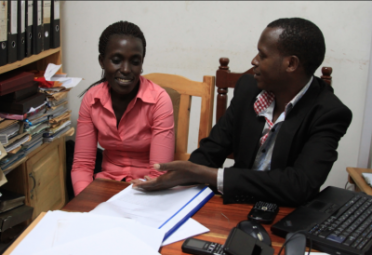
A large majority of young survivors still suffer from mental health issues as a result of the genocide, but few mechanisms are in place to provide support. Aside from immense personal losses and psychological suffering, the genocide also caused substantive material damage to survivors. Today, thousands of young people are in the midst of legal battles to retrieve stolen property or land, which once belonged to their family. With little knowledge of the legal system and limited resources to pay lawyers, many survivors still require a legal education to know their rights and how to enforce them.
Since its launch in August 2013, the helpline has received over 1,500 calls and supported 338 clients. While the majority of clients call initially for legal support, it transpires that most are also suffering from the effects of trauma and show signs of mental health. Our national sensitization efforts have reached 23,310 individuals so far to learn more about the symptoms of trauma, and their legal rights. The Helpline, even at early stage, has resolved 75 legal cases, of which a majority for claims of land, owned by the parents of survivors, that had been misappropriated by others during genocide. The value of these reclaimed land cases is estimated at 373,600,000 RWF (£370,000). With an average land value of 5,000,000 RWF (£5,000), the reclaiming of land as an asset means that young survivors have secured lifetime earnings that will benefit them long after the conclusion of the project.
More effort is being made to raise awareness in Rwanda, and to ensure that young survivors are both aware and comfortable using the service. This small and innovative project has the potential to reach thousands of more vulnerable survivors, building on the successes and experience gained over its first full year of operation in 2014.
Further funding is partly in place ahead to support and extend the helpline, however a full scale up will require longer term and significant funding. We are confident that, having successfully piloted this programme, we will attract greater support for this work.
Kamonyi Centre
Funder: Nicholas Roth Memorial Trust, Various
Duration: Complete
Partners: CNLG
In March 2014, Survivors Fund (SURF) transferred ownership of the Kamonyi Centre, a purpose-built site for the preservation of the memory of the Genocide against the Tutsi in Rwanda, as told by survivors, to Rwanda’s National Commission for the Fight against Genocide (CNLG). This historic transfer took place at the centre itself, in the District of Kamonyi, 45 minutes from Kigali.
In handing over the keys to the building Françoise Lemagnen, Chief Executive of SURF, thanked the District of Kamonyi for providing the land and its support, as well as the British public, in particular the family of Nicholas Roth, for funding the construction of the centre.
She said, “SURF has finally found the right partner to take on the ownership and mission of the centre – CNLG. It is particularly significant in this 20th anniversary year that CNLG take up this important project and that they are considering the possibility of housing the Gacaca records at Kamonyi. I wish them well in this task and offer them sincere thanks on behalf of all those who have contributed to the Kamonyi Centre.”
In its signed transfer letter to the Executive Secretary of CNLG, SURF said, “In particular, we are encouraged that CNLG is exploring further the possibility of using the building to archive the documentation from Gacaca, and to work towards the original vision for the Centre to be used for the research and documentation of the genocide.”
Ultimately the funding that Survivors Fund (SURF) secured to make possible the construction of the Centre was on the proviso that it were to be dedicated for the purpose of the preservation of the memory of the genocide in Rwanda, as told by survivors, in order to help prevent a reoccurrence of genocide; and for the collection and archiving of material related to the history of the 1994 genocide in Rwanda.
We look forward to CNLG working towards realising that goal over the years ahead and welcome their recent attribution of the Kamonyi centre to the Kamonyi district in pursuit of genocide research.
University Sponsorship Programme
Funder: Good Gifts, L.I.F.E For Health, Individual Donors, Benon Memorial Fund
Duration: Ongoing
Partners: Led by SURF
Since its inception, Survivors Fund (SURF) has supported over 3,000 students to graduate in secondary school and university education, who have no other means of finance. With the significant support of the Charities Advisory Trust and other donors, we have been able to accelerate this work and also provide vital supplementary funding for scholastic materials and transport for those young survivors which receive government scholarships which cover only their tuition fees.
Funds are used to support survivors to be self-reliant through support for their education. In collaboration with AERG, the student genocide orphans’ association, SURF has provided hardship allowances to students who would otherwise have dropped out of education. In certain cases students have managed to get to university, by doing odd jobs, and suddenly in their 3rd or 4th year they have lost their income and can no longer sustain their studies. SURF is sometimes required to provide counseling and advocacy support to keep them in school. Dropping out can deeply affect students and also their dependents. This fund has helped us meet some of their needs.
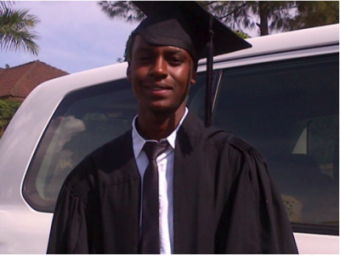
During 2014 we were able to support 38 students by providing tuition, transport, accommodation and school materials. We have also provided hardship allowances, burial assistance and medical assistance so that they can continue their education. A number of students studying IT and Accountancy were supported specifically by funds raised in honour and memory of the late Benon Banya, SURF’s accountant who tragically died in 2013 whilst undertaking a sponsored climb of Mount Kilimanjaro.
Project Umubano
Back in 2007, Survivors Fund (SURF) assisted the UK Conservative Party to organise Project Umubano, a two-week international social action programme for party members to provide them with a unique first-hand experience of international development. Survivors Fund (SURF) has continued to support the annual visit each year through hosting a team from the visiting party to undertake a project with our partner organisations.
In July 2014, the Project Umubano team led a project with our partner organisations to strengthen their Monitoring & Evaluation (M&E) skills, to enable them to better respond to the increasing demand of donors for more systematic reporting of projects. The team conducted M&E training for 12 local NGOs and SURF partners, which included study tours and course work, with external M&E specialists from DFID, ActionAid and VSO. The programme incorporated a competitive element, and the winning project by AVEGA Agahozo (Association of Genocide Widows) was for developing the use of energy-saving stoves, provided by Charities Advisory Trust.
Energy-saving stoves use about one-third of the wood compared to conventional stoves, and thus save cost and time to collect the wood. The stoves emit limited or no smoke at all, depending on how dry the wood is. With energy saving stoves, beneficiaries free up their wood collection time and/or or cost in terms of buying the wood that in turn allows them to engage in economic activities like learning more meaningful trades that they can do while cooking, such as knitting or studying; this helps improve both income prospects, learning and improves the health of the beneficiaries.
Project Umubano business specialists also worked on a two-week Training of Trainers programme to support trainers from SURF/AERG’s Youth Entrepreneurship Training Programme. A curriculum, adapted with permission from the Westminster Business School, London, was used with trainers and students. Our plan ahead, with Project Umubano Business team, is to further support training to support YETP, our new DFID Programme ELE, and also to help us build a Business Incubator curriculum for AERG’s new business centre.
Commemoration
In December 2013, SURF and its partners agreed to form a coalition – The Task Force to Remember Survivors 20 – to raise awareness of the ongoing challenges of survivors, and to call for tangible commitments from the Government of Rwanda and the international community to address their critical needs.
The Task Force played a pivotal role in coordinating partner organisations to leverage media interest in the anniversary of the genocide, resulting in coverage of survivors issues across major print and broadcast outlets, including a front cover story in the Guardian, features on Channel 4 News, BBC World Service, BBC Newsnight, CNN, AFP, and broadcast interviews with BBC Radio and TV, Al Jazeera, SBS Australia and others. In total the media team of the Taskforce fielded 100 international media requests, of which half resulted in published articles and coverage. SURF supported partner organisations in their collective media message, developing their online presence and partnering with the national coordination effort around the 20th anniversary.
SURF participated, supported and spoke at a number of commemoration events to mark the twentieth anniversary of the genocide, including the UK Kwibuka20 Global Conversations commemoration event at the Houses of Parliament, the UN’s Outreach Programme on the Genocide against the Tutsi in Rwanda and the reading of testimonies in 30 countries, the UK Kwibuka20 national commemoration in Birmingham, the UNESCO commemoration event in France, and the closing events at the UK’s National Holocaust Centre. SURF was the chosen charity at King’s College London’s “Rwanda in Photographs: Death Then, Life Now” exhibition, and spoke at the 20th anniversary commemoration event at King’s College London chapel. SURF Rwanda supported a number of commemoration events in Rwanda and participated in the international conference in Kigali.
In addition, SURF supported Holocaust Memorial Day in 2014, facilitating for speakers to address a number of events across the UK as well as attending the UK Prime Minister’s event at 10 Downing Street.
